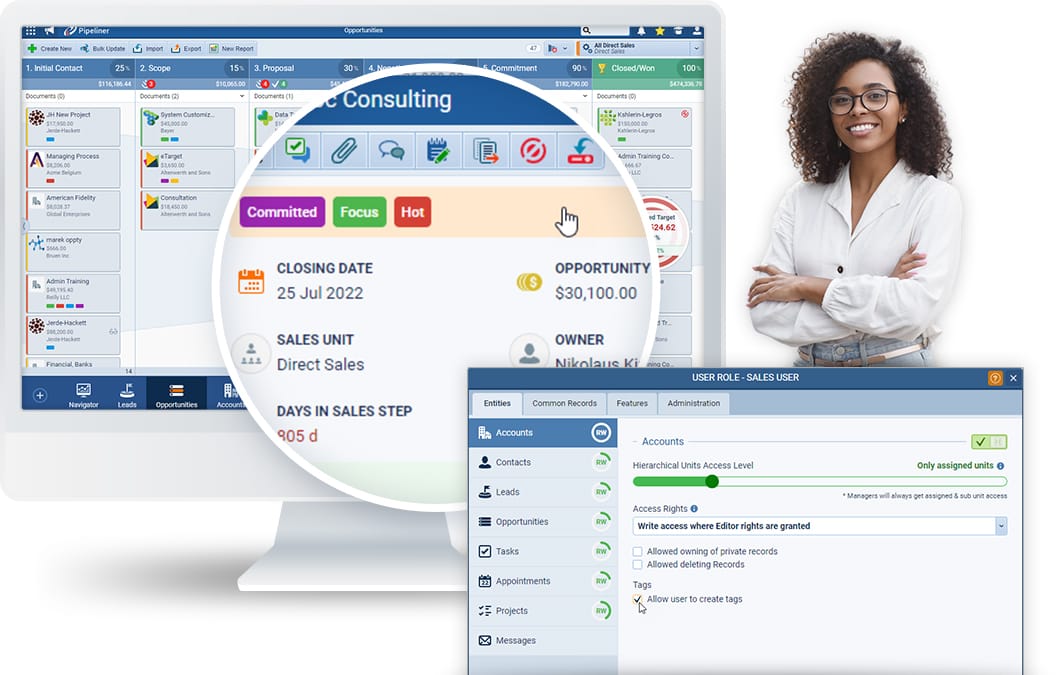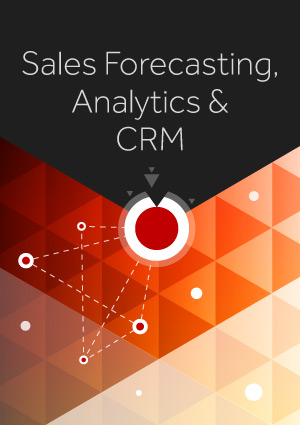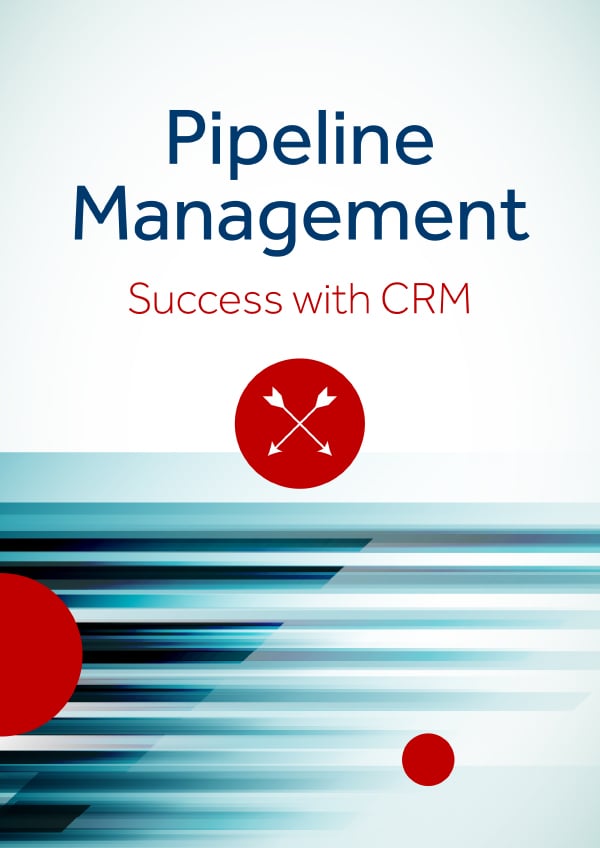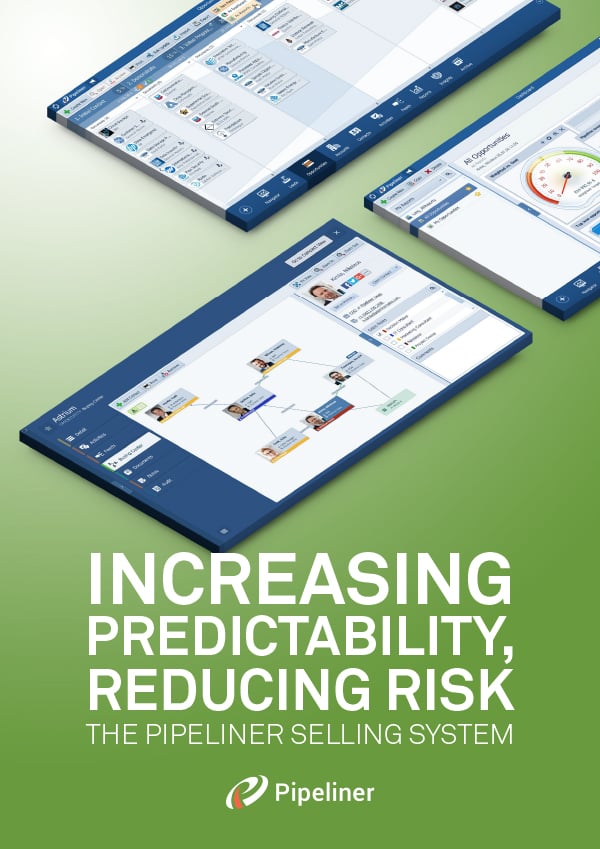CustomerCustomer Customer is an individual or an organization that purchases a product or signs up for a service offered by a business. Relationship Management Software
What is CRM
- What is CRM?
- Customer Relationship Management Software
- Account Management Software
- Contact Management Software
- Sales Lead Management
- Opportunity Management
- Sales Pipeline Management
- Customer Relationship Mapping
- Sales Enablement Tools
- Sales Management Software
- Sales Process
- Sales Reporting
- Task Management
- Custom Fields
- Team Collaboration
- KPIs for Sales & Leading and Lagging Indicators
- CRM Past Failures?
What is Customer Management Relationship?
The relationship between a business and its customers is a valued, essential bond of trust and loyalty shared by both parties. With so many customers, however, a company requires a system to manage and foster those relationships.
CRM software (Customer Relationship Management) tracks and manages customer relationships. It tracks interactions between a company, its prospects, and its current customers. CRM software products integrate all relevant customer dataData Data is a set of quantitative and qualitative facts that can be used as reference or inputs for computations, analyses, descriptions, predictions, reasoning and planning., such as contact information, history, and transaction summaries, into a single, concise live record.
However, CRM systems do much more than just store data—they unify customer and company information from across various departments, including marketingMarketing Marketing is the field, set of actions, or practice of making a product or service desirable to a target consumer segment, with the ultimate aim of effecting a purchase., sales, digital commerce, and customer service. Modern CRM tools even leverage AI to help manage relationships across the entire customer lifecycle, creating a single, secure, and customizable dashboard that displays purchase history, order status, outstanding service issues, and more. This single source of truth is invaluable, especially as customers now expect every representative to be familiar with their entire history with your business.
Whether someone reaches out via phone, chat, email, or social media, everyone in your company can instantly access the latest details, enabling a consistent and efficient customer experience. Having all this information in one place doesn’t just benefit customers; it helps your company stay organized and focused on revenueRevenue Revenue is the amount of money a business generates during a specific period such as a year or a quarter; also called sales.-generating activities. Sales teams generate a flood of data, and if that information gets lost in handwritten notes or personal laptops, essential details slip through the cracks and opportunities are missed. With CRM software, you reduce administrative work, ensure smooth handoffs, and keep critical business knowledge inside your company, not just in your employees’ heads.
In essence, a Customer Relationship Management system helps companies stay connected to customers, streamline processes, and improve profitabilityProfitability Profitability is the potential, degree, metric, ability or relative efficiency of a business to yield financial gain (i.e., profits) after all relevant expenses and costs have been deducted..
This article will delve more in-depth into the basics of Customer Management relationships, ultimately answering the question: What is a Customer Management Relationship?

The Purpose of Customer Relationship Management
A customer management relationship serves two company functions while acting as the organizationOrganization Organization is a cohesive group of people working together and formally bound by a shared identity (e.g., one team, company, club, etc.) and a common purpose (e.g., business growth, athletic victory, etc.).’s focal point for all customer connections:
Salespeople
CRM is a salespeople’s system to track and report each sale or potential sale.
Because salespeople are responsible for delivering the majority of revenue, CRM software should simplify their jobs simpler rather than make them more difficult or time-consuming. Despite this, the latter approach is the foundation of many CRM solutions today.
Considering the importance of sales representatives’ responsibilities, it is only natural that a CRM solutionSolution Solution is a combination of ideas, strategies, processes, technologies and services that effectively helps an organization achieve its goals or hurdle its challenges. should empower them. This solution should be extremely intuitive and simple to use so that a salesperson can quickly learn and enjoy using it. To clear up any misunderstandings, help should be just a click away from the salesperson’s specific query.
Sales Management
The sales manager is not in the hot seat when it comes to closing deals; instead, the salespeople are under pressure to make sales.
Due to the lack of a suitable CRM solution, the sales managerSales Manager Sales Manager is an executive who leads a sales unit, team or department by setting goals and meeting targets, formulating plans and policies, designating tasks, and developing salespeople. must rely on data directly from the salespeople, as is often the case in businesses. Relying on secondhand information is a risky strategy. It may or may not be correct, but it will serve as the foundation for management decisions and reports.
A truly effective CRM solution, then, provides sales management with a thorough understanding of every stage of the sales processSales Process Sales Process is a series of strategic steps or a set of activities aimed at driving sales growth through the alignment of personnel, market insight, methodologies, relevant business units, and technology., including leads, their ranking and assignment, sales that are about to close, priority opportunities, transactions that need customer support assistance, and more. A sales manager must be able to see in real-time which reps are succeeding, which need help, and which may fail.
More Than Just Sales: CRM Across the Organization
A CRM brings your teams together, sharing information that makes everyone’s job easier. For example, marketers can use CRM tools to manage campaigns and leadLead Lead refers to a prospect or potential customer (who can be an individual or organization) that exhibits interest in your service or product; or any additional information about such entity. customer journeys with a data-driven approach. CRM software provides visibility into every opportunity or lead, showing a clear path from inquiry to sale. Commerce teams can utilize CRM to offer personalized online experiences, while customer service agents have instant access to a customer’s complete history, enabling them to provide faster and more tailored support.
Modern CRM systems serve as powerful listening engines, gathering information from a wide range of sources, both within and outside your business. With built-in AI, they can reveal key insights into customer sentiment and highlight trends, helping you identify problems early, refine your offerings, and uncover new opportunities.
CRM software enables you to store customer and prospect contact information, identify sales opportunities, record service issues, and manage marketing campaigns—all in one central, secure, and easy-to-use location, accessible to everyone who needs it. This includes storing emails, phone numbers, social media handles, and a complete record of all interactions with your company.
Experience Pipeliner CRM Now
The Components of Customer Relationship Management
Customer Relationship Management (CRM) software, at its most basic level, consolidates and documents customer information into a single CRM database, allowing company users to access and manage it more easily.
But today’s CRM solutions go even further—most live in the cloud, making them accessible anytime, anywhere, from any device. This not only boosts collaboration and reduces costs by eliminating hardware and complicated version controls, but also ensures security and scalability as your business grows. Cloud-based CRMs can integrate with your favorite business tools, such as document signing, accounting, billing, or survey apps, providing a comprehensive 360-degree view of your customers and enabling real-time, seamless information sharing across your organization.
How Cloud-Based CRM Is Different
In the early days, CRM systems were housed strictly on company servers—think hulking hardware in a back room, accessible only at the office. Today’s cloud-based CRM solutions have completely transformed the landscape.
There’s no physical installation or server upkeep required. Instead, all your customer information is stored securely online, allowing employees to access, update, and collaborate in real time, no matter where they are—at headquarters, on the road, or even working from a cozy café abroad.
A few key advantages stand out:
- Lower upfront costs: With cloud CRM, there’s no need for expensive infrastructure or hardware investments. You subscribe for the number of users and features you need, and easily scale as your business grows.
- Simplicity for IT teams: Maintenance headaches are mostly eliminated—no software patches to install manually or compatibility puzzles to solve. All updates and version control happen automatically in the background.
- Easy collaboration: Since everyone works from the same live database, teams always have up-to-date information, preventing mix-ups and bottlenecks.
- Anytime, anywhere access: Whether you’re using a desktop, tablet, or mobile phone, cloud CRM keeps your team plugged in and productive.
Beyond convenience, cloud CRMs often come with additional layers of security, ensuring that company and customer data remain protected—something that’s crucial whether you’re working with clients in Tacoma or Tokyo.
Several more features have gotten added over time to make customer management relationship systems more useful.
Recording various customer interactions via email, phone, social media, or other channels; automating different workflow automation processes, such as tasks, calendars, and alerts, depending on system capabilities; and allowing managers to track performance and productivity based on information logged within the system are just a few of these functions.
With that, here are some of the components of Customer Relationship Management:
AnalyticsAnalytics Analytics is the active study of different types of data with the aim of discovering meaningful patterns and translating these into insight (such as historical analyses and forecasts), or action (such as those intended to improve business performance).
By evaluating userUser User means a person who uses or consumes a product or a service, usually a digital device or an online service. data and assisting in creating focused marketing efforts, CRM analytics help improve customer satisfaction rates.
Artificial Intelligence
Artificial intelligence has been integrated into Customer Relationship Management platforms to automate tedious processes, discover consumer buying trends, anticipate future customer behavior, and more.
Contact Center Automation
Contact center automation may involve pre-recorded audio that aids in customer problem-solving and information distribution. It is designed to eliminate the tedious portions of a contact center agent’s job. Customer requests can be handled using various software tools that interface with the agent’s desktop tools, reducing call length and simplifying customer service processes.
Geolocation Technology
Some CRM systems can construct geographic marketing campaigns based on their clients’ real locations. They can even integrate with popular location-based GPS apps.
Human Resource Management
CRM systems allow businesses to keep track of employee information such as contact information, performance reviews, and benefits. The HR department will be able to manage the internal personnel better.
Lead Management
CRM can handle sales leads, allowing sales teams to input, track, and analyze data for leads all in one place.
Marketing Automation
Customer management relationship platforms with marketing automation features can automate repetitive operations to improve lead generationLead Generation Lead Generation is a set of activities aimed at generating interest around a product or service through methods such as 1. content marketing (blogging, podcasts, free downloads); 2. advertising (PPC, banner ads, Yellow Pages, sponsoring an event); 3. referrals (recommendations from existing customers and other people); 4. outbound marketing (cold email, cold calling), and 5. partnerships (joint ventures, affiliate marketing). marketing efforts at various life cycle stages.
Project Management
Some CRM systems have tools that enable users to keep track of clientClient A client is an entity who pays another entity for products purchased or services rendered. Also called a customer. project details like objectives, strategic alignment, processes, risk management, and progress.
Salesforce Automation
Salesforce automation solutions manage customer interactions and automate certain sales cycleSales Cycle Sales Cycle is a repeating process characterized by a predictable sequence of stages that a company undergoes as it sells its products and services to customers. business operations such as following up on leads, acquiring new clients, and maintaining customer loyalty.
Workflow Automation
Customer Relationship Management solutions assist firms in streamlining routine processes, allowing personnel to focus on more creative and high-level duties.
Integration with Other Software
Many CRM systems can interact with other applications, such as call centers and ERP systems.
The Benefits of Customer Relationship Management to Businesses
CRM systems may help organizations of all sizes, from small businesses to giant corporations, by:
Holding customer information such as previous purchases and interaction history can aid customer care professionals in providing better and faster service
Using reporting and visualization features to collect and access customer data can help firms detect trends and insights about their customers
Automating tedious but necessary sales funnelSales Funnel Sales Funnel is a visualization of the sales process that defines the stages through which prospective customers go through as they are led by sales professionals towards a purchasing decision. and customer support tasks
Conclusion
Despite all of the advances in customer relationship management technology, without adequate management, a CRM system can quickly devolve into a glorified database where client data is stored.
Thus, before supplementing CRM data with other sources of information, organizations should invest time cleaning up their existing customer data to avoid duplicates and incomplete records.
Ultimately, sales management can do what it is supposed to do with the correct customer relationship management decisions: manage sales to ever-increasing levels of viability and profitability for the organization.




